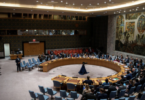F.P. Report
NEW YORK: A New York man was found guilty by a federal jury in Brooklyn, following a three-week trial before U.S. District Judge Nicholas G. Garaufis, of one count of conspiracy to provide material support to the Islamic State of Iraq and al-Sham (ISIS), and five substantive counts of providing material support to ISIS.
According to court documents and evidence presented at trial, Mirsad Kandic, 40, of Brooklyn, New York, and Kosovo, Bosnia and Herzegovina, was a high-ranking member of ISIS, a designated foreign terrorist organization. He had multiple responsibilities within the global terrorist organization, including recruiting foreign fighters, trafficking foreign fighters from the West through Turkey and into Syria, and obtaining weapons, military equipment, maps, money, and false identifications for ISIS fighters. In carrying out these responsibilities, the defendant worked directly with ISIS emirs and battlefield commanders, including Bajro Ikanovic, who commanded an ISIS training camp in Syria beginning in or around 2014. Ikanovic, in turn, reported to Omar Shishani, then the top military commander for ISIS, and a key advisor to Abu Bakr al-Baghdadi, who was, at the time, the leader of ISIS and the self-declared Caliph of the Islamic State.
According to the testimony of 36 witnesses and evidence drawn from six continents, Kandic attempted to leave the United States to fight jihad as early as the summer of 2012. He was denied boarding at the United States point of departure and notified that he was on the no-fly list. In January 2013, Kandic attempted to fly from Toronto, Canada, to Istanbul, Turkey, on a direct flight. He was again denied boarding. The defendant then took a two-day Greyhound bus ride from New York City to Monterrey, Mexico, in November 2013, and flew through Panama, Brazil, Portugal, Germany, Kosovo, and Turkey before arriving in Syria at the end of 2013. In Syria, Kandic joined ISIS and became a fighter for the group in Haritan, an ISIS stronghold in the outskirts of Aleppo, wielding Russian-made PK machine guns and AK-47 assault rifles.
ISIS leadership then directed Kandic to Turkey to take up the role of smuggling foreign fighters and weapons into Syria from abroad, and to serve as an emir for ISIS media. Kandic disseminated ISIS recruitment messages and gruesome propaganda using more than 120 Twitter accounts. For example, Kandic sent out an ISIS-produced “documentary” titled the “Flames of War.” This video celebrated ISIS conquests and macabre executions of ISIS captives, including instances where victims were forced to dig their own graves before being summarily executed by gunshot. The defendant tweeted that this video was the “best thing ever seen on screen.”
Kandic was also a dedicated and prolific recruiter of foreign fighters for ISIS. He sent thousands of radicalized ISIS volunteer fighters from Western countries into ISIS-controlled territories in Syria and elsewhere in the Middle East. This included a fellow New Yorker who became an ISIS sniper and sniper trainer, and another individual who became an emir for ISIS safehouses in the Idlib province of Syria.
One foreign fighter recruited by the defendant was Jake Bilardi of Australia. Bilardi contacted the defendant in June 2014 for assistance in traveling to Syria to join ISIS. Kandic provided Bilardi – who had just turned 18 years old and had never traveled internationally before – with instructions and guidance for reaching Istanbul, Turkey. Kandic then arranged for Bilardi to be picked up at the airport in Istanbul and smuggled him into Syria. Kandic maintained contact with Bilardi as he became an ISIS fighter and ISIS suicide bomber. Bilardi went on to commit a suicide truck attack with fellow ISIS members on March 11, 2015, in Ramadi, Iraq, killing himself, more than 30 Iraqi soldiers, and an Iraqi policeman. Prior to the attack, the defendant wished Bilardi well and stated, “May Allah make [their] inner organs implode.” After the attack, Kandic praised Bilardi, both on Twitter and to a co-conspirator. In audio recordings referencing similar suicide attacks, the defendant praised the killing of more than 90 people as “good.”
In addition, Kandic provided battlefield intelligence and maps to ISIS battlefield commanders and fighters on the ground, including Ikanovic. Kandic also conspired with Ikanovic and other ISIS members in Syria to dig tunnels under the Turkey-Syria border to move 800-1000 fighters into ISIS at a time. Kandic also shaped the information environment in which ISIS operated by enforcing ISIS media and publicity discipline. For example, the defendant directed other ISIS supporters to refrain from posting any information about the success (or failure) of ISIS recruitment efforts as well as to minimize any reporting about ISIS military action. Kandic also managed money for ISIS fighters in Syria, including two ISIS fighters who gave the defendant their bank cards, from which bank records showed more than $40,000 was transacted. Kandic smuggled weapons to ISIS in Syria, including a rifle scope for an ISIS sniper. Kandic operated a private market via Telegram – called “Khilafah (Caliphate) Market” – for which the defendant was the group administrator with authority to restrict access to the group. Members frequently posted firearms and military equipment for sale, including mortars, suicide belts, assault rifles, and other firearms. Among the members of the defendant’s private Telegram market was Abu Luqman, who, at the time, was the ISIS governor for the Raqqa province, ISIS’s de facto capital in Syria.
Kandic was arrested in Sarajevo, Bosnia and Herzegovina. He was convicted of one count of conspiracy to provide material support to ISIS and five substantive counts of providing material support to ISIS in the forms of personnel, including himself, Bilardi, and others, as well as services, weapons, property, and equipment, and false documentation and identification. At sentencing, he faces a maximum sentence of life imprisonment on the two counts resulting in death, and 20 years’ imprisonment on each of the other four charges. A federal district court judge will determine any sentence after considering the U.S. Sentencing Guidelines and other statutory factors.
Assistant U.S. Attorneys Saritha Komatireddy, J. Matthew Haggans, and Josh Hafetz for the Eastern District of New York are prosecuting the case, with valuable assistance provided by Trial Attorney Jennifer Levy of the National Security Division’s Counterterrorism Section and paralegals Matt Wulf and Huda Abouchaer.
The Justice Department’s Office of International Affairs, the FBI’s Legal Attachés abroad, and foreign authorities in multiple countries on three continents provided critical assistance in this case. The Justice Department extends its appreciation to the Bosnian State Investigation and Protection Agency, the Bosnian State Intelligence and Security Agency, the Bosnian Foreigner’s Affairs Service, the Bosnian State Prosecutor’s Office, the Australian Federal Police, the Victoria Police (Australia), the Australian Border Force, the Australian Department of Foreign Affairs and Trade, the Australian Attorney-General’s Department, the Prosecutor General’s Office of the Republic of Kazakhstan, the Iraqi Ministry of Defense, Joint Operations Command in Iraq, and the FBI Legal Attaché Offices in Sarajevo, Canberra, Nur-Sultan, and Baghdad, for their extraordinary assistance in the investigation and prosecution.
The department also thanks the Ministry of Justice for the Republic of Finland, the Stuttgart Police Department and Federal Office of Justice in the Federal Republic of Germany, the Department of Justice & Constitutional Development in the Republic of South Africa, and the central authorities responsible for mutual legal assistance in Albania, North Macedonia, Montenegro, and Ukraine, as well as FBI’s Legal Attaché Offices in those countries for their assistance in the investigation.






